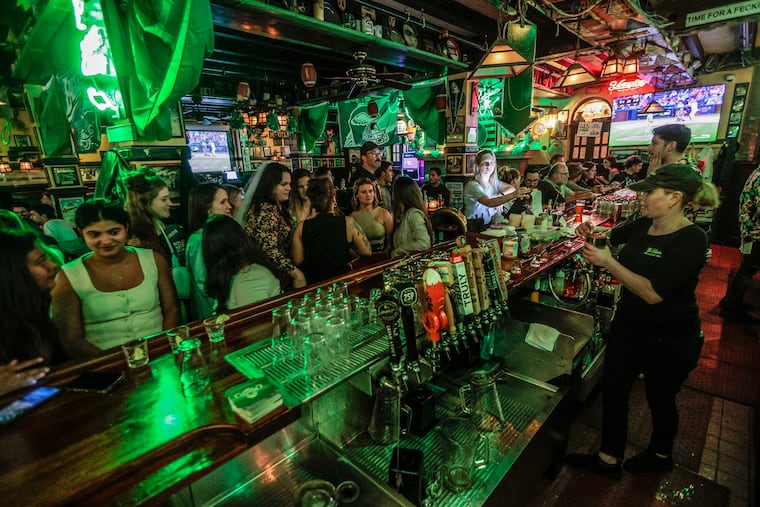Philly’s ‘Night Mayor’ has had the job for a year. Here’s what he’s learned.
The night time economy isn't just about bars, restaurants and nightclubs. Philly's nightime economy director also cares about "people who want to sleep."

The city’s department of commerce is looking to turn Philadelphia into a 24-hour city.
The department published its inaugural nighttime economy report on Thursday, which outlines the work the first nighttime economy director, Raheem Manning, has undertaken this year.
Since his appointment last year, Manning has built an advisory council made up of 25 members including city officials, business owners, residents, and representatives from local organizations. He’s also gone on a “listening tour” with 181 stops to engage with businesses, residents, and other community groups and organizations, as well as four police ride-alongs.
“The overarching message with a lot of the listening stops … was that everyone was excited that there was someone representing their interests in city government,” Manning said.
The listening tours informed the six areas, defined in the report, Manning hopes to address to improve the “growth and vitality” of the night economy: public safety, trash, transportation, ease of doing business, access to business support, and the creation of an impact study.
Manning shared with The Inquirer what he has learned in his first year.
An impact study could help define the nighttime economy
The department of commerce will undertake an economic impact study to better understand the nighttime economy, according to the report. The study would help define the scope and economic impact of the sector.
“When you’re running any business organization or government entity, you need to know where your numbers are; you need to know what is the economic impact of the sector,” said Manning. “Because this is a new initiative for the city, we need to get the data. We need to see where the dollars are.”
The study would cost between $200,000 to $300,000 and will take six to eight months, according to Manning.
Some of the city’s nightlife saw a boost in late night business this year, according to data from Square, a payment app. The share of money spent between 7 p.m. and 4 a.m. at businesses that use Square increased from 24% in 2022 to 30% this year.
A monthly call with other nighttime leaders around the country
Manning is a board member of the Nighttime Economy Culture and Policy Alliance and talks with other nighttime economy leaders around the country including in New York and Austin on a monthly basis.
“Talking to other cities and seeing how they’re doing things is really helpful to inform the work that we’re doing here,” he said.
The calls have allowed him to hear about programming and best practices being undertaken in other places.
Insight from other cities helped inform a bill introduced by Councilmember Isaiah Thomas last month and written in partnership with Manning. The bill looks to tailor the definition of nightclub so that regulations can be better adjusted to businesses.
Representative of people who want to sleep (and businesses beyond nightlife)
Philadelphia has more than 4,000 bars, food businesses, sports and recreation establishments, and other venues that operate at night, according to the report, citing 2022 data from the Bureau of Labor Statistics. Those businesses employ an estimated 60,728 people and collectively pay $2,515,967,139 in wages.
But bars, clubs, restaurants, and music and sports venues aren’t the only businesses running through the night. The report defines the nightlife economy as also including medical centers, child care, gas stations, and grocery stores, among others.
“We’re looking to support the entire nighttime economy,” Manning said.
And even those who aren’t awake past 10 p.m. are affected by the work Manning and his team are doing to support nightlife.
“It’s also people who want to sleep and making sure that we’re mitigating those nuisance things so that their quality of sleep or quality of life at night is maintained as well,” Manning said.
Philadelphia’s nightlife is a ‘regional hub’
It’s important to attract people from the suburbs and the region at large to Philadelphia for its nightlife, Manning said.
“We’re a regional hub. Even though we are in Philadelphia, we support a cultural, nightlife and entertainment scene for seven counties around us. We have to make sure that those people continue to come back in and support the growth of our nighttime economy,” he said.
There are some transportation issues that nighttime travelers face, the report indicates. People on the listening tour expressed safety concerns in some transportation hubs because of inadequate lighting or unsanitary conditions, and there is a desire for more transportation options at night, including 24-hour SEPTA service and bikeshare and e-scooters options.
Looking ahead: Expanding support for the nighttime economy
“People aren’t just sleeping at night, and people aren’t just partying at night. There is a need for our third shift workers to have access to services — and beyond city government,” Manning said.
Going forward, the city will expand its staff capacity to support the night economy, which includes hiring a program manager.
“We’re thinking through all the possible options to better support the businesses that operate in the city,” he said.